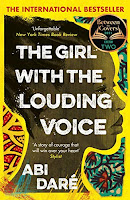 |
| (Amazon UK link) |
This month’s read is ‘The Girl with the Louding Voice’ by Abi Daré. I had not heard of the author or the book, despite it having won awards, and being a bestseller. It was available inexpensively for the Kindle a few months ago, so I downloaded it and have just finished reading prior to today's meeting. The author is Nigerian, and the book is set in Nigeria in 2014. It’s told in the voice of 14-year-old Adunni, who, at the start of the story, lives with her widowed father and two brothers.
We quickly learn that Adunni desperately misses her mother, who was determined that her daughter receive a full education. The family live in a small village, where poverty is rife. Starvation is looming, even though Adunni was taken out of school when her mother died. And so she is to be married to a local taxi driver. He is old enough to be her father and has two wives already, but he’s willing to pay a high price to enable her father to stay out of debt.
It took me a while to get used to the style of writing, which is supposedly typical of a girl with limited education and is full of grammar errors. Yet somehow it’s not hard to read, after the first few pages. What’s hard is realising that as recently as a decade ago young girls were expected to bow to their fathers and submit to beatings as well as arbitrary commands. Even more so that they could be married as young as fourteen, and that they had no say over who they might marry. I had already heard from local Nigerians that polygamy is still not just legal but culturally expected.
It’s a depressing start to the book, and Adunni’s marriage is as horrendous as she fears; she’s repeatedly violated (without gratuitous details, thankfully) by her new husband, and also treated to verbal and physical abuse by his first wife. The second wife befriends her, and they become quite close until a tragedy happens, and Adunni is forced to run away…
The second half of the book takes place in Lagos, the first big city Adunni has seen. She is, at first, awed and overwhelmed by the amount of traffic, by the huge shops, and bright-coloured fabrics. It’s quite interesting seeing things through her rather naive eyes, in her broken English. She becomes a housemaid to a very wealthy woman - and she, too, regularly beats Adunni.
By this stage, I almost gave up on the book. I could see that, if based on reality (and I’m sure it is) that it’s a story that needs to be told. Fiction is an excellent way of raising awareness of society problems, and this book has sold a lot of copies. However I wasn’t sure I could take much more negativity. It was hard to believe anyone could survive so much abuse, let alone a girl of fourteen who didn’t get enough to eat and had to work over twelve hours every day.
But I decided to keep going, and I’m glad I did. The second half of the book is more encouraging, with a hopeful ending, even if left somewhat open. Many more issues are covered, and at times I was a bit frustrated that Adunni keeps on asking questions that will obviously get her into trouble. I was also a bit puzzled as to why she doesn’t guess what happened to her predecessor Rebecca; nobody is willing to talk about her, but it is fairly obvious why she had vanished. Yet Adunni seems surprised when she eventually learns the truth.
There are some extremely unpleasant characters, but the book also unmasks what sounds like a terrible culture not just of male dominance but of female subjugation and abuse. Adunni’s dream is to be a teacher with what she calls a ‘louding voice’; she longs for more education, and, eventually, to start a school in her home village. She’s feisty and determined and I admired her, while remaining a little sceptical as to whether anyone with such a hard-working life could stay as strong as she does.
I thought the style was quite clever: the grammar of the narration improves as Adunni starts learning from a kind, friendly neighbour. I liked the way that the neighbour learns from Adunni too, and begins to see how horrendous her life has been. I was glad that there were one or two nice people, even if one of them was Ghanaian rather than Nigerian, and others had been brought up abroad. I’m not sure I ever fully empathised with Adunni; she’s a complex character but I couldn’t entirely believe in her. Thankfully the extensive abuse isn’t given in gratuitous detail.
It’s not a book I’m likely to read again, but overall, I’m glad I read it. Recommended if you’d like to know more about some of these aspects of Nigerian culture, and if you can deal with the negativity of the first half of the book and the rather bizarre writing style.
No comments:
Post a Comment